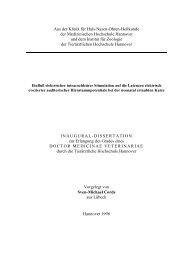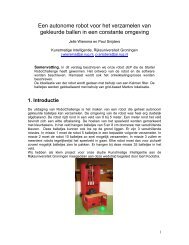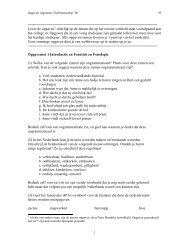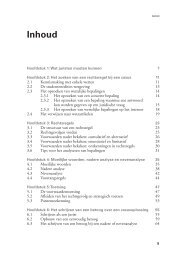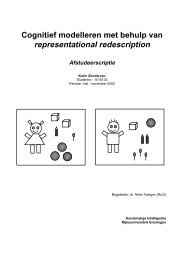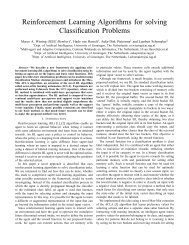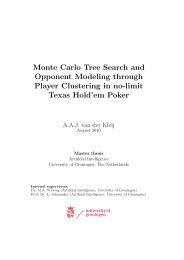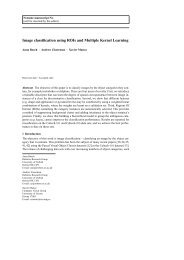Presuppositions in Spoken Discourse
Presuppositions in Spoken Discourse
Presuppositions in Spoken Discourse
You also want an ePaper? Increase the reach of your titles
YUMPU automatically turns print PDFs into web optimized ePapers that Google loves.
Accommodation and Presupposition<br />
(1) factive, triggered p: Everybody else <strong>in</strong> the college was us<strong>in</strong>g (visual aids) all<br />
the time. (MAINACC) (2-11b 1306), four participants.<br />
Speaker A: but if you‘re do<strong>in</strong>g *them* by all the International House th<strong>in</strong>gs and - sort<br />
of - drills and all this all this bus<strong>in</strong>ess or did you just sort of do it (a)<br />
Speaker d: oh well I could remember some of them . the drill th<strong>in</strong>gs~| (b)<br />
Speaker A: yes. (c)<br />
Speaker d: And a few more of them came back and I gradually realized that<br />
everybody else <strong>in</strong> this college was us<strong>in</strong>g them all the time. You know,<br />
visual aids, prompts, this sort of lark. (d)<br />
Speaker A: Horrors (e)<br />
Speaker d: Situations (f)<br />
(2) aspectual verb, triggered p: He (cous<strong>in</strong> of Speaker B) was writ<strong>in</strong>g his thesis<br />
earlier (MAINACC) (2-10 991)<br />
Speaker B: I have a cous<strong>in</strong> a bit like you actually. he used to throw his children<br />
bananas to eat . when they were hungry yes (a)<br />
Speaker c: *[gjum] ( - - - laughs)* (b)<br />
Speaker B: Just casually toss a banana, to a three month old child - tossed<br />
across the room, carry on writ<strong>in</strong>g his thesis (laughs). It was an<br />
absolute pigsty. (c)<br />
For both examples, b<strong>in</strong>d<strong>in</strong>g was ruled out as a potential <strong>in</strong>terpretation. There are<br />
no utterances that communicate the same or similar <strong>in</strong>formation <strong>in</strong> the context. In<br />
example (1), Speaker A acknowledges Speaker d’s utterance and therefore also the<br />
presupposition. The presupposition may only be partially resolvable until l<strong>in</strong>e (d)<br />
where Speaker d clarifies what reference was <strong>in</strong>tended for the pronoun them <strong>in</strong> his<br />
last utterance of that l<strong>in</strong>e. In the discourse from which example (1) is taken there is<br />
noth<strong>in</strong>g said about other college employees us<strong>in</strong>g visual aids or other types of<br />
International House type drills.<br />
In example (2) there is no <strong>in</strong>formation that the subject of Speaker B’s<br />
utterance had been work<strong>in</strong>g on a thesis prior to the time of the utterance. This is<br />
also marked rather explicitly <strong>in</strong> Speaker B’s utterance <strong>in</strong> l<strong>in</strong>e (a), e.g. “I have a<br />
cous<strong>in</strong>”, suggest<strong>in</strong>g that Speaker c probably isn’t aware even of the existence of the<br />
<strong>in</strong>dividual. The conversation from which example (2) was taken was between four<br />
participants, <strong>in</strong>clud<strong>in</strong>g Speaker B’s spouse (no utterances shown above) and it is<br />
conceivable that this <strong>in</strong>dividual may have already known about the cous<strong>in</strong> and his<br />
habits, but because Speaker B seems to be address<strong>in</strong>g his/her story to Speaker c, it<br />
seems to be <strong>in</strong>formation that the speaker believes is hearer-new. Note that neither<br />
of these presuppositions could be considered unexpected or predictable<br />
<strong>in</strong>formation.<br />
5.1.2 Global Accommodation<br />
The examples categorized as GLOBAL accommodation <strong>in</strong> the table were<br />
presuppositions triggered <strong>in</strong> an embedded context but were accommodated <strong>in</strong> the<br />
ma<strong>in</strong> DRS, formerly considered presuppositions that were projected. This group is<br />
103



